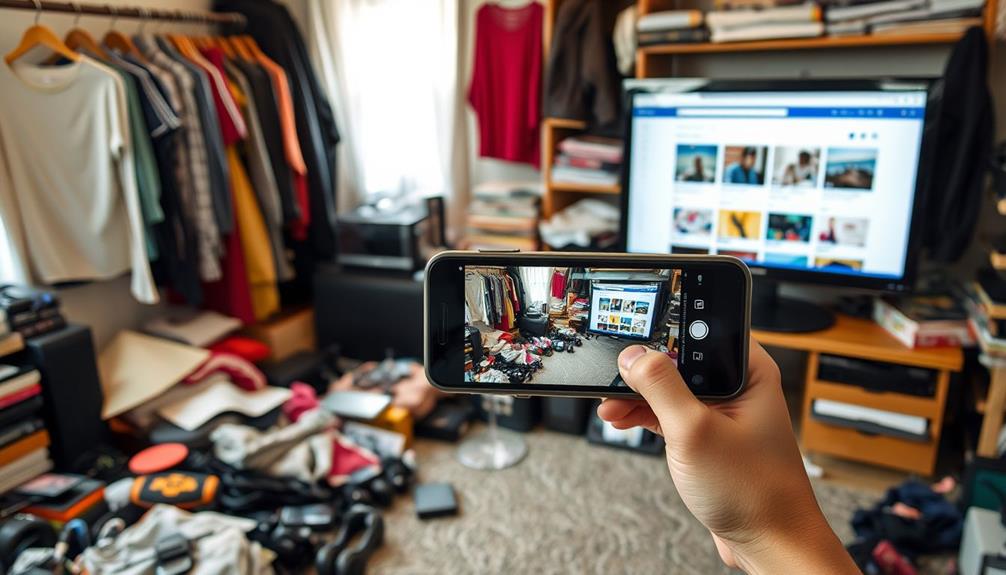The latte factor debate centers on whether tiny daily expenses like coffees are harmless treats or major distractions from your financial goals. While small costs might seem trivial, they can add up over time and impact your savings. Balancing enjoyment with mindful spending is key. If you want to discover how these small habits could be holding you back—and how to manage them wisely—you’ll find valuable insights ahead.
Key Takeaways
- Small daily expenses like lattes can add up over time and impact overall savings.
- The debate questions whether tiny indulgences distract from larger financial goals.
- Mindful management of small expenses can foster healthier financial habits and discipline.
- Prioritizing significant savings or debt reduction may yield greater long-term financial benefits.
- Balancing small pleasures with big savings is key to sustainable financial well-being.

Have you ever wondered if skipping your daily latte could really make a difference in your financial future? It’s a common question, and the answer isn’t always straightforward. Many people see these small expenses as insignificant, just a little treat here and there. But when you add them up over time, they can reveal a lot about your spending habits and your overall approach to money. Some argue that focusing on luxury spending, like daily coffee runs, distracts you from bigger financial goals, while others believe these small indulgences are harmless or even necessary for your well-being. The real debate centers on whether tiny expenses are just a distraction or a genuine obstacle to building wealth.
Small daily expenses can add up and impact your financial future more than you think.
If you’re serious about improving your savings habits, it’s worth examining how your daily expenses fit into your broader financial picture. Luxury spending, like that daily latte, might seem trivial, but it can symbolize broader patterns of discretionary spending. If you’re used to splurging on small luxuries regularly, it might be a sign that your spending habits are less disciplined than they could be. Cutting back on these costs can free up money that you can redirect toward savings or investments. This doesn’t mean you have to give up everything you enjoy; it’s more about being mindful of where your money goes and whether those small expenses align with your financial priorities.
Some financial experts argue that these tiny expenses are just a distraction because they give you a false sense of spending control. They suggest that focusing on larger, more impactful savings opportunities, like reducing high-interest debt or increasing retirement contributions, is a smarter move. Others believe that small changes, like skipping a daily latte, can serve as a gateway to healthier financial habits. When you see how much money you save by making small adjustments, it can motivate you to take bigger steps. Over time, these small savings can add up appreciably, helping you build a more secure financial future.
Additionally, understanding the psychological impact of small expenses can help you develop a more mindful approach to spending and savings. At the end of the day, whether you see luxury spending as a distraction or a manageable indulgence depends on your goals and habits. If you’re committed to improving your financial health, it’s worth considering how your daily choices impact your ability to save and invest. Small expenses may seem insignificant now, but they can become powerful drivers of change if you stay aware and intentional. The key is striking a balance: enjoy your daily treats without letting them undermine your larger savings ambitions. After all, financial progress often starts with small, mindful decisions.
Frequently Asked Questions
How Do Small Expenses Accumulate Over a Lifetime?
Small expenses add up over your lifetime because of opportunity cost and behavioral economics. Every time you spend a little, you’re missing out on potential savings or investments that could grow over time. These tiny costs seem insignificant, but they influence your financial habits and decision-making. Over years, they compound, reducing your ability to reach big financial goals, making it essential to be mindful of even small expenses.
Can Eliminating Latte Costs Significantly Boost Savings?
If you cut back on your coffee habits, you can really boost your savings over time. Eliminating daily routines like buying lattes saves you money that adds up fast. While the amount might seem small each day, removing these expenses reduces unnecessary spending, allowing you to invest or save more. So yes, cutting out latte costs can make a meaningful difference in your financial journey.
What Are Common Psychological Traps in Budgeting?
When budgeting, you often fall into psychological traps like impulse buying and emotional spending. These habits make it harder to stick to your plan because you buy things on impulse or when you’re emotional, rather than based on your actual needs. To avoid these traps, you need to recognize your triggers and create strategies, like setting purchase limits or taking time before making big decisions, to keep your budget on track.
How to Prioritize Big Financial Goals Over Small Indulgences?
You should prioritize your big financial goals by recognizing how luxury spending and impulse buys can derail progress. Make a clear plan, set specific targets, and remind yourself of long-term benefits. When tempted by small indulgences, pause and evaluate if they align with your goals. Building discipline helps you cut back on unnecessary expenses, keeping your focus on saving and investing for the future rather than succumbing to fleeting temptations.
Are There Alternative Methods to Cut Expenses Without Deprivation?
Did you know that 60% of Americans overspend due to lack of spending awareness? To cut expenses without deprivation, you can adopt frugal habits like meal planning, using cashback apps, and setting spending limits. These strategies help you save money while still enjoying life. By practicing mindful spending, you keep your finances healthy without feeling deprived, making it easier to reach your financial goals.
Conclusion
As you reflect on the latte factor, remember that those small expenses can quietly add up, just like leaves drifting onto a quiet pond. It’s easy to dismiss a daily coffee, but over time, they can create ripples in your finances. Sometimes, it’s the tiniest habits—like a fleeting smile or a small purchase—that shape your financial landscape. So, stay mindful, and watch how tiny changes can unexpectedly open the door to big savings.










